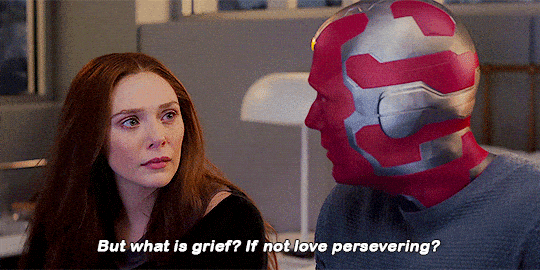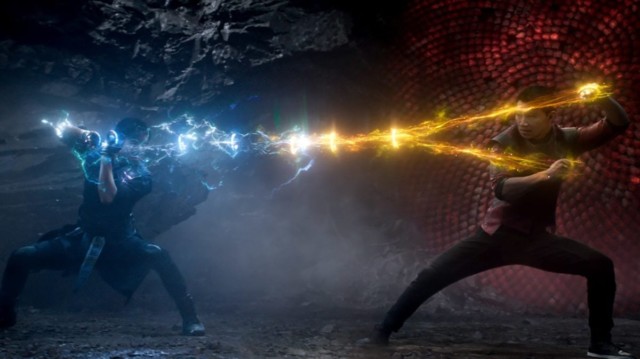Phase 4: The Marvel Cinematic Universe’s Deep Dive into Grief

Phase 3 ended with large losses for our characters, including the death of Tony Stark, Natasha Romanoff, and the disappearance of Steve Rogers to the rest of the world. This world is in pieces and disarray, our characters have lost everything, and we the viewers have lost something too. Phase 4 now has the opportunity to explore the themes of grief, and how the surviving characters will deal with it. The early contributions of the Disney Plus shows have made it very clear that Marvel intends to discuss the losses of these characters, and where it leaves the remaining heroes and villains in this world.
Our first Disney+ show, WandaVision explores Wanda’s grief over her love interest Vision, her parents and brother Pietro, and every other person close to her that has been lost over the years. It explores how these emotions not only charge her powers but activate a long-dormant part of Wanda.
This introduces a new and dangerous power to the MCU, one that is certain to make shockwaves in the future. Wanda’s grief is manipulated by Agatha and eventually leads to her finally becoming The Scarlet Witch, an incredibly powerful Nexus Being.

Monica Rambeau on the other hand must deal with the grief of returning 5 years later to find her mother Maria’s cancer had returned while she was away. It was a particularly cruel twist to have Monica believe Maria was in remission one moment, Thanos snapped away for 5 years, only to return and find her mother had become sick again and died in her absence. I expect to see Monica continue to process her grief and shock of losing her mother in The Marvels.
The Falcon and The Winter Soldier delves into the grief of a world without Captain America, and with many families reeling from the Blip. Bucky makes efforts to atone for his past as the mind-controlled Winter Soldier, by at first taking vengeance on those who gave the orders for his hits.
He then comes to realize that he must also try to connect to the families and friends of those he has killed in his mind-controlled past, as painful as that might be to face. All this while dealing with his own feelings of isolation, especially after Steve’s return to the past.
In the meantime, Sam struggles to help support his family, deal with his own grief over his friend Steve being gone, and the possibility of taking over as the next Captain America – a mantle he is neither sure he wants nor deserves as the series begins. Isaiah Bradley as well is a character full of grief, pain, and torment with all that he had been through in his life.
Phase 4 will delve into the grief of our heroes, and fans alike, that much is clear. Hawkeye deals with the consequences of a hero whose grief and the resulting need for vengeance consumed him and controlled him for five years following Thanos snapping his wife and children away.
This show explores many themes of grief alongside Clint’s, especially regarding the lost hero Natasha Romanoff, as we are reintroduced to her sister Yelena. In a similarly cruel twist to Monica and Maria Rambeau’s, Yelena had been reunited with her estranged sister Natasha during Black Widow only to be snapped away and return to find her sister has died.
Yelena blames Clint Barton for Natasha’s death. Clint himself believes he deserved to die instead of Natasha, and most likely believes he killed Nat (in a way) as well, even if for different reasons than that of Yelena. Both of them may also be suffering from “survivor’s guilt” over Natasha’s death as well.
Dealing with the grief of losing such a beloved hero as Natasha is important, especially for audience members that felt her own solo film Black Widow, alongside Endgame, did not do her justice or provide enough of a send-off following her sacrifice for the lives of trillions.
Hawkeye is the perfect example of grief and the reluctance to move on following tragic and dramatic events. I feel it could be the best example regarding Phase 4’s use of grief and how they intend to process the deaths of our heroes in this universe, for both the characters themselves and us, the audience.
Shang-Chi and the Legend of the Ten Rings, deals with a family’s grief over the loss of a beloved mother and wife. Each family member handles their grief differently, with father Wenwu reacting with a combination of heartbreak, hopelessness, vengeful rage, and such denial that he’s willing to destroy his family and other innocent people to try to save his love.

Black Panther: Wakanda Forever will undoubtedly deal with the loss of T’Challa and Chadwick Boseman and the grief the world felt with his passing. It is my hope that it honors his contributions and memory for the change and inspiration he brought to the world.
These are just examples of how each character is dealing with the loss of our heroes and villains alike, as time moves forward. This helps us connect with them because a part of ourselves lost something too, we lost Captain America, Iron Man, and Black Widow. Phase 4 is building the future of this universe with every show, but fans still need to grieve. We need to acknowledge and grieve what was lost in order to move forward and better appreciate what comes next.
Grief is a universal language. We all feel it, understand it, and it hurts, for every one of us. Our characters in this universe are not immune to it either, and with every new tv show and movie, our characters are missing a part of themselves in one way or another, whether it be a friend lost that they could not save, a part of themselves lost because of the Blip, or perhaps their own fear of being in a world they have suddenly returned to 5 years later.
Phase 4 is not just the beginning of a new era for the Marvel Cinematic Universe, it is not just a time where our heroes and villains alike are simply replaced, and we are told to accept their new replacements. It is a time to grieve, to love, and to connect to our characters as, alongside us, they continue to grow.
We will see some of our favorites leave, followed by the introduction of new heroes, but through it all, Phase 4 does not want us to just feel like our characters are being ‘replaced’, but that they are evolving. Their story is growing, their grief is growing into new emotions, and we will feel the same.
[Editor’s Note: This article was written by Jake Hansen]


